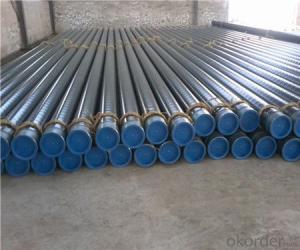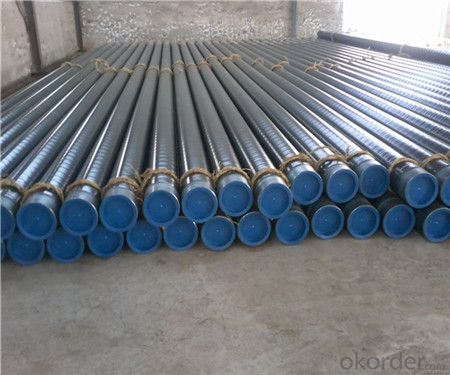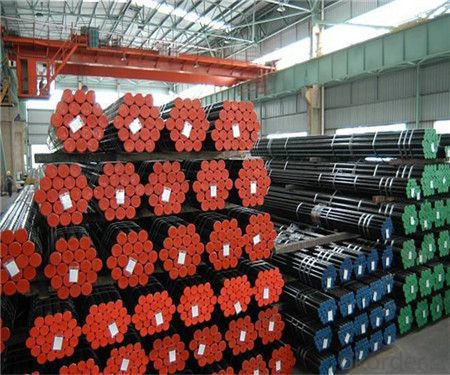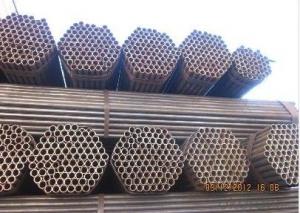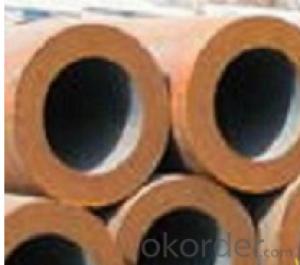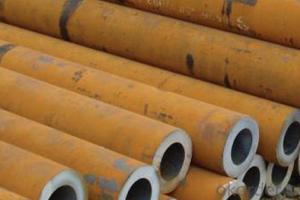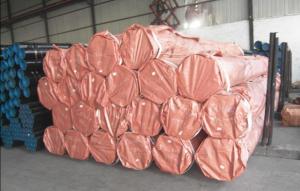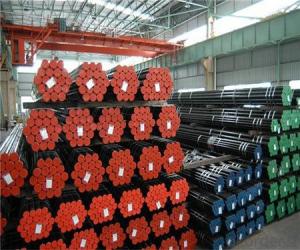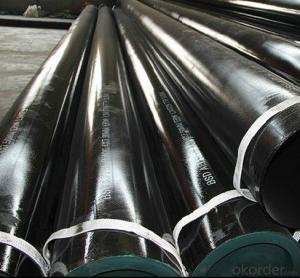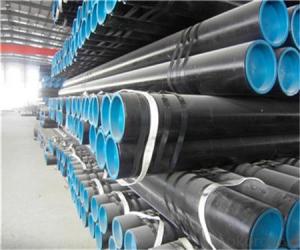ASTM A106/A53/API5L Gr.B Seamless Steel Pipe supplier
- Loading Port:
- Tianjin
- Payment Terms:
- TT OR LC
- Min Order Qty:
- 20 m.t.
- Supply Capability:
- 9000 m.t./month
OKorder Service Pledge
OKorder Financial Service
You Might Also Like
Product Description:
1、Structure of Seamless Pipe ASTM A106/53 Description:
Seamless pipe is formed by drawing a solid billet over a piercing rod to create the hollow shell. As the manufacturing process does not include any welding, seamless pipes are perceived to be stronger and more reliable. Historically seamless pipe was regarded as withstanding pressure better than other types, and was often more easily available than welded pipe.
2、Main Features of the Seamless Pipe ASTM A106/53:
• High manufacturing accuracy
• High strength
• Small inertia resistance
• Strong heat dissipation ability
• Good visual effect
• Reasonable price
3、Seamless Pipe ASTM A106/53 Specification:
Standard | GB, DIN, ASTM |
Grade | 10#-45#, 16Mn |
Thickness | 8 - 33 mm |
Section Shape | Round |
Outer Diameter | 133 - 219 mm |
Place of Origin | Shandong, China (Mainland) |
Secondary Or Not | Non-secondary |
Application | Hydraulic Pipe |
Technique | Cold Drawn |
Certification | API |
Surface Treatment | factory state or painted black |
Special Pipe | API Pipe |
Alloy Or Not | Non-alloy |
Length | 5-12M |
Outer Diameter | 21.3-610mm |
Grade | 20#, 45#, Q345, API J55, API K55, API L80, API N80, API P110, A53B |
Standard | ASME, ASTM |
4、Seamless Pipe ASTM A106/53 Images:
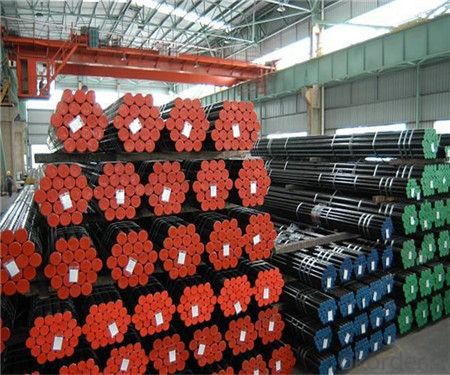
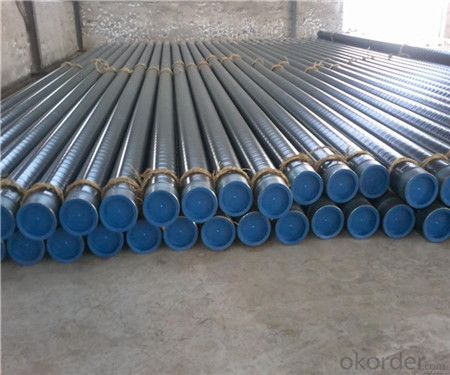
FAQ of Seamless Pipe ASTM A106/53:
①Quality
Our products are manufactured strictly according to national and internaional standard, and we take a test
on every pipe before delivered out. If you want see our quality certifications and all kinds of testing report, please just ask us for it.
Guaranteed: If products’ quality don’t accord to discription as we give or the promise before you place order, we promise 100% refund.
②Price
Yes, we are factory and be able to give you lowest price below market one, and we have a policy that “ for saving time and absolutely honest business attitude, we quote as lowest as possible for any customer, and discount can be given according to quantity”,if you like bargain and factory price is not low enough as you think, just don’t waste your time.Please trust the quotation we would give you, it is professional one.
Why us?
Chose happens because of quality, then price, We can give you both.Additionally, we can also offer professional products inquiry, products knowledge train(for agents), smooth goods delivery, exellent customer solution proposals.Our service formula: good quality+good price+good service=customer’s trust
SGS test is available, customer inspection before shipping is welcome, third party inspection is no problem.
Looking forward to doing the corporation with you
Any question, kindly feel free to contact us !
- Q: How do you prevent steel pipes from rusting?
- Various measures can be taken to prevent the rusting of steel pipes. One effective method is the application of a protective coating on the surface of the pipes. Different types of coatings, such as paint, epoxy, or zinc, can be used for this purpose. These coatings act as a barrier between the steel and the corrosive environment, thereby preventing direct contact between moisture, oxygen, and the metal, which can lead to rust formation. Another approach involves the use of corrosion inhibitors. These substances are added to the water or fluid flowing through the pipes, creating a protective film on the surface of the steel. This film acts as a shield, inhibiting the corrosion process and preventing the formation of rust. Regular maintenance plays a crucial role in preventing rust on steel pipes. It is essential to inspect the pipes regularly for any signs of damage or corrosion and promptly repair or replace any compromised areas. Additionally, keeping the pipes clean and dry by removing accumulated dirt or moisture helps prevent the formation of rust. In some cases, using stainless steel pipes instead of regular steel can be beneficial. Stainless steel contains chromium, which forms a passive oxide layer on the metal's surface. This layer acts as a natural barrier against corrosion, making stainless steel pipes highly resistant to rust. Finally, controlling the installation environment of the pipes can also help prevent rust. This can be achieved by maintaining proper ventilation, controlling humidity levels, and avoiding exposure to harsh chemicals or corrosive substances. By implementing these preventive measures, the lifespan and integrity of steel pipes can be significantly extended, while minimizing the risk of rust formation.
- Q: Can steel pipes be used for structural supports?
- Yes, steel pipes can be used as structural supports due to their high strength, durability, and ability to withstand heavy loads. They are commonly used in construction for applications such as columns, beams, and braces, providing stability and support to various structures.
- Q: Can steel pipes be used for water supply systems?
- Yes, steel pipes can be used for water supply systems. Steel pipes are commonly used in water distribution systems due to their strength, durability, and resistance to corrosion. However, it is important to ensure that the steel pipes are properly coated or lined to prevent rusting and contamination of the water supply. Regular maintenance and inspection are also crucial to ensure the longevity and safety of steel pipes in water supply systems.
- Q: What's the difference between stainless steel seamless tube and stainless steel welded pipe?
- Stainless steel welded pipe is also a hollow section of steel, but it is welded through the plate into the steel pipe, so there is a welded steel pipe welding gap.
- Q: Can steel pipes be used for aboveground applications?
- Yes, steel pipes can be used for aboveground applications. They are commonly used in various aboveground structures such as buildings, bridges, and pipelines due to their strength, durability, and resistance to environmental conditions.
- Q: What are the potential health hazards associated with steel pipe installation?
- Some potential health hazards associated with steel pipe installation include exposure to hazardous chemicals used in the coating or treatment of the pipes, inhalation of dust or fumes generated during cutting or welding, and physical injuries due to accidents or mishandling of heavy equipment. Additionally, improper handling or disposal of waste materials and contaminated water can pose environmental health risks. It is important to follow proper safety protocols, use personal protective equipment, and ensure proper ventilation and waste management to mitigate these hazards.
- Q: What's the difference between hot-rolled seamless steel tube and cold-rolled seamless steel tube?
- The difference between hot rolled seamless steel tube and cold rolled seamless steel tube:1) cold-rolled seamless tubes tend to be of small diameter, and hot-rolled seamless tubes are often of large diameter.2) the accuracy of cold-rolled seamless steel tube is higher than that of hot-rolled seamless steel tube, and the price is higher than that of hot-rolled seamless steel tube.
- Q: Are steel pipes suitable for oil and petroleum applications?
- Yes, steel pipes are widely used in oil and petroleum applications due to their superior strength, durability, and resistance to corrosion. These pipes are capable of withstanding high pressure and extreme temperatures, making them suitable for transporting oil and petroleum over long distances. Steel pipes also have the advantage of being able to withstand external forces such as impact and vibrations, which are common in the oil and petroleum industry. Additionally, steel pipes can be easily welded and connected, allowing for efficient and cost-effective installation. Overall, steel pipes are the preferred choice for oil and petroleum applications due to their reliability and ability to ensure the safe and efficient transportation of these valuable resources.
- Q: Can steel pipes be used for underground drainage systems?
- Yes, steel pipes can be used for underground drainage systems.
- Q: How are steel pipes used in the manufacturing of telecommunications infrastructure?
- Steel pipes are used in the manufacturing of telecommunications infrastructure to provide a sturdy and reliable framework for cables and wires. These pipes are commonly used for underground and overhead installations, ensuring protection and support for the necessary communication systems.
Send your message to us
ASTM A106/A53/API5L Gr.B Seamless Steel Pipe supplier
- Loading Port:
- Tianjin
- Payment Terms:
- TT OR LC
- Min Order Qty:
- 20 m.t.
- Supply Capability:
- 9000 m.t./month
OKorder Service Pledge
OKorder Financial Service
Similar products
Hot products
Hot Searches
Related keywords
